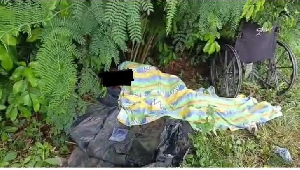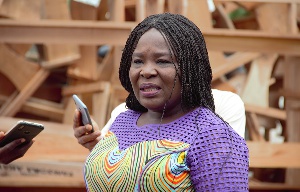Doubtless, the tragic story of the hit-and-run patient of the Winneba Trauma and Specialist Hospital allegedly discharged, transported in an ambulance, and dumped at a roadside at Gomoa Ojobi, believed to be her hometown, raises numerous questions.
The incapacitated old woman’s reportedly appalling treatment and subsequent death in the open is beyond comprehension. Allegedly, she was discharged and abandoned mainly because no relative showed up.
According to media reports, admitted to the hospital on May 29, 2024, and she spent six days there before her discharge. She reportedly died at the roadside on June 10. Interestingly, it’s understood that her body was taken back to that same hospital.
But perhaps this bewildering, distressing incident in the Central Region presents Ghana with an opportunity to enact the long-planned but inexplicably delayed safety net, a law for the welfare of the aged.
Noticeably, even in this hectic election 2024 campaign period, we are yet to hear much on the political platforms about plans for the old, or the importance attached – if any – to targeting the ‘grey vote’, elderly people’s votes. Yet, it is normally the elderly who take an interest in national elections.
Ghanaians pride themselves on their respect for old age and attention to the care of the old, even non-family members, so how does one explain the Ojobi national shame?
What a shocking irony, an accident victim admitted to a trauma hospital reportedly ending up being subjected to such trauma, as depicted by the heartrending video circulating online! And it must be extremely distressing for social protection activists, especially the HelpAge Ghana organisation.
It’s noteworthy that as far back as 2010, recognition of the need for a national policy spelling out caring for the nation’s senior citizens, led to a proposal for an ‘Aged Persons Bill’ to be passed into law, and a National Council for the Aged established. However, apparently the draft has still not been finalised to become law! Some 14 years after the innovative decision it’s still a work in progress!
In a 2017, news release to mark World Health Day, the then Executive Director of HelpAge Ghana, Ebenezer Adjetey-Sorsey, noted that “Ghana has a national Policy approved by Cabinet in 2010 which has “Old Age and Health” as one of the seven key challenges to be addressed.”
Dr Adjetey-Sorsey is now a lecturer at the University of Professional Studies, Accra, but also a volunteer at HelpAge Ghana (for Research, Policy Development and Advocacy). Earlier this week, he expressed to me their disappointment about the long delay adding: “HelpAge Ghana is a national age care organisation registered in December 1988 to promote the welfare of the Ghanaian older person.”
A 2018 statement by the Gender Ministry had announced emphatically “AGED BILL BEING PREPARED TO BE PASSED INTO LAW”. It stated that the Department of Social Welfare of the Ministry of Gender, Children & Social Protection had organised a National Consultative Meeting with all relevant stakeholders on the Bill for Aged Persons in Koforidua on August 14, 2018.
Yet, evidently that Koforidua meeting six years ago, has still not borne fruit.
Regarding the Winneba incident, strangely, as at the time of writing this article, despite the victim’s six days hospital admission, even her name and age have not been stated in any of the reports. Nor is there any information about her family.
Not surprisingly, the harrowing video of the woman on the ground, both legs in plaster of Paris (POP) and a wheelchair beside her, is causing widespread outrage and demands for harsh sanction for those responsible.
Meanwhile, the Medical Director of the Hospital, Dr George Prah, has been suspended temporarily until a committee constituted by the Ghana Health Service finishes its investigation into the incident.
Minister of Health Dr Bernard Okoe Boye has reportedly given the GHS a maximum of 30 days to complete the investigation and submit a report.
However, the Daily Guide newspaper of June 18, 2024, reported that following his temporary suspension, Dr Prah has released a statement in which he insists that the hospital did nothing wrong.
“The hospital took responsibility for feeding, medication and housekeeping of the patient…After she was admitted for six days, she was finally discharged on June 3, 2024 after being declared well.
“After the patient was declared well… coupled with the fact that she was itching to leave the hospital, a consensus was reached to transport her to her preferred destination after clothing her nicely and a wheelchair made available to her.
“Sincerely speaking …the hospital played its role as expected by taking care of the patient. But the inevitable happened,” the doctor insists.
Given the conflicting narratives, what the public has gathered and Dr Prah’s statement, conceivably, the report from the GHS investigation is keenly awaited by all who seek justice for the victim.
It is commendable that the GHS has set up a committee to look into the matter, but does it really need a whole month to find out how an accident victim taken to a specialist trauma hospital, ended up dying at a roadside?
As stated earlier, the scandalous abandonment of the patient generates many questions, including why her relatives apparently didn’t report her missing, or look for her during the period that she was on admission.
While we await the report of the committee, other questions include: the role of the medical staff apart, what about the National Ambulance Service driver and whoever instructed the alleged dumping? How could they sleep at night, knowing they had left a fellow human being, a defenceless, incapacitated aged person out there?
Was nobody concerned about how she would get food? Or that she was lying on the ground, in the bush? Who was to assist her with the wheelchair, apparently so thoughtfully provided?
Appreciation must go to the person who filmed the video that has told the country this harrowing story, which otherwise would have remained hidden. Nevertheless, that person, too, has questions to answer: when did they see her there; and why didn’t they report to the police?
Above all, why discharge an obviously unwell, unrecovered patient? Probably because of payment issues. And this is where most likely, if there had been an Aged Persons Law or Aged Council, there would have been guidance as to what is to be done in such circumstances.
Dr Adjetey-Sorsey believes that the main cause of the inaction on the Bill is that there seems to be no official or department in charge of pushing it.
He summed up his frustration over the delay thus: “It is a wasted opportunity to add life to the years of older persons and, painfully, I believe that it’s intentional based on ignorance of the issues at stake.”
In my opinion, Ghana failed the tragic old woman; woefully so.
Thus the Government should begin to correct this disgraceful national failure by taking definitive steps to protect the aged. And for a start, the Ministry of Gender, Children & Social Protection needs to ensure the speedy finalisation of the ‘Aged Persons Bill and its passage into law.
Furthermore, when her identity has been established, I suggest that the law, or an aspect of it, should bear the name of the tragic Ojobi accident victim.
Opinions of Friday, 21 June 2024
Columnist: Ajoa Yeboah-Afari















